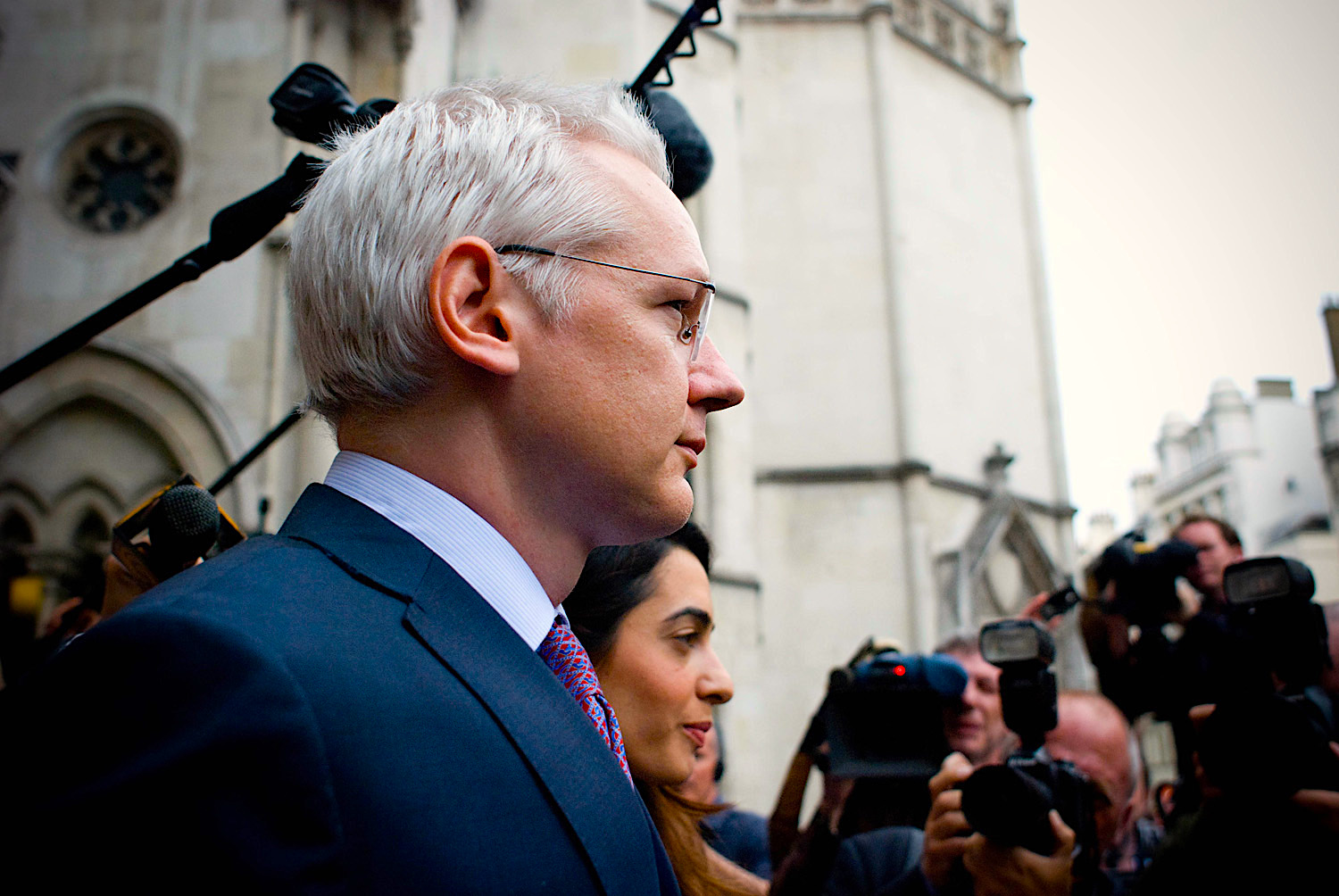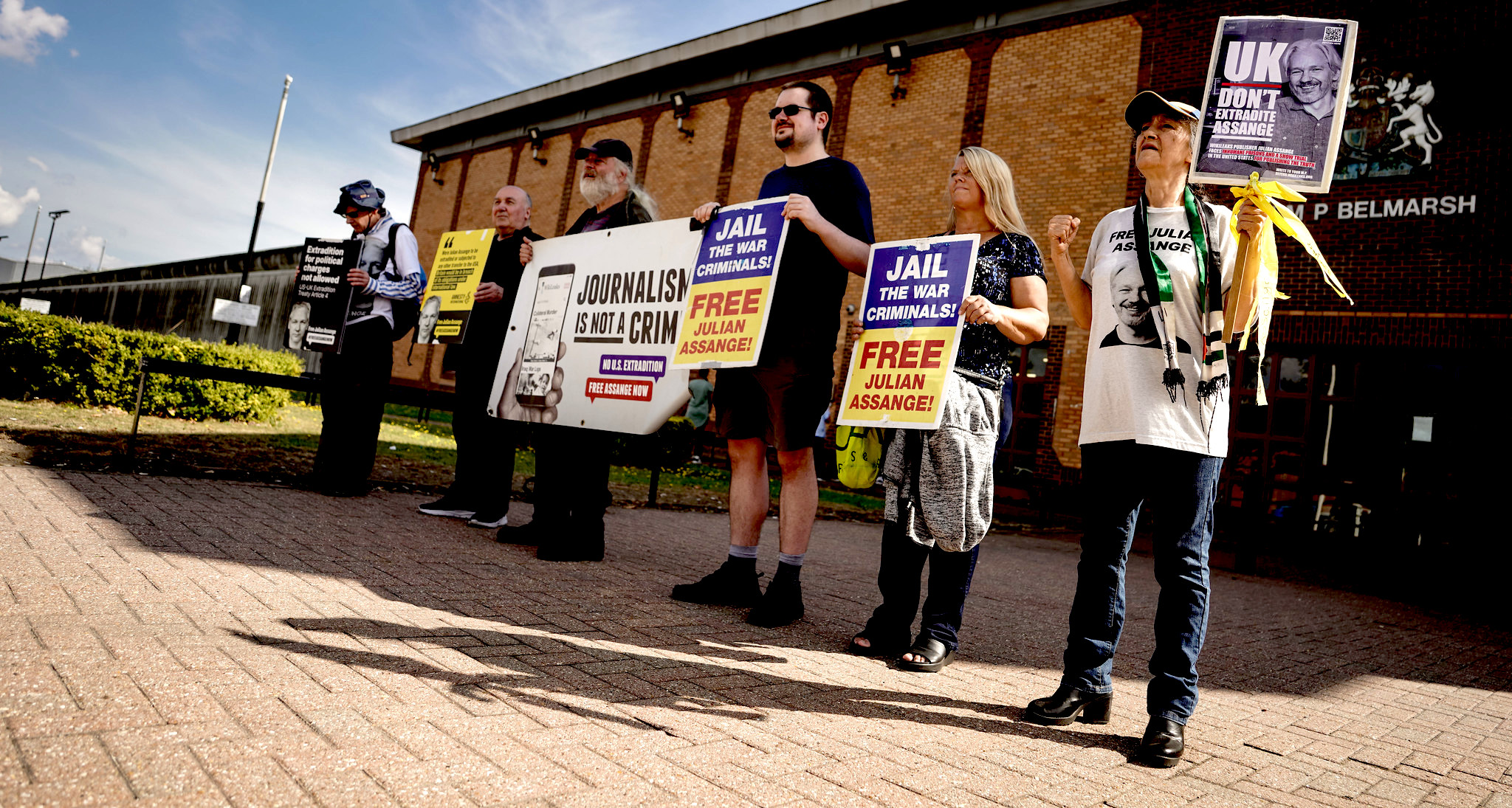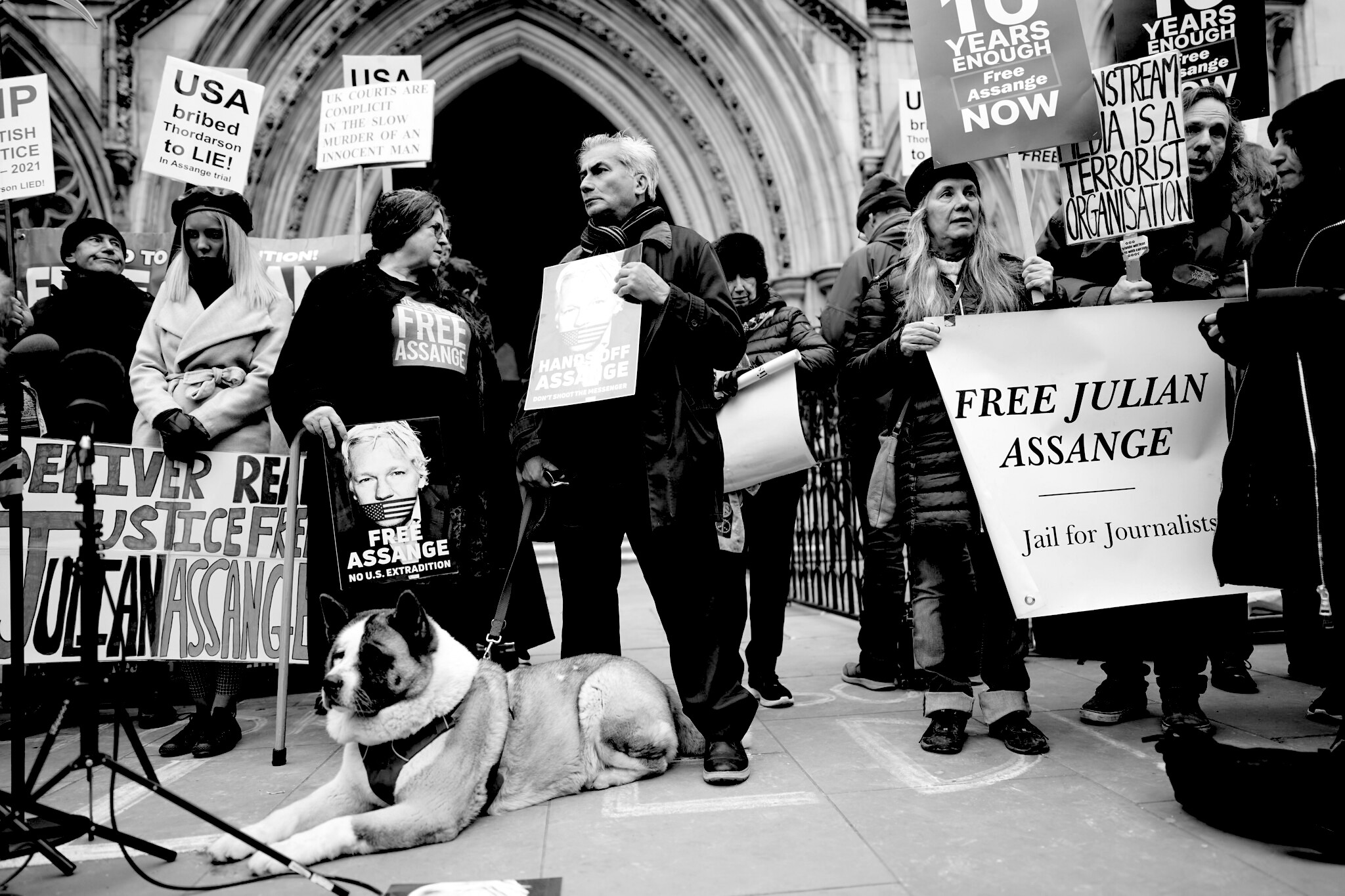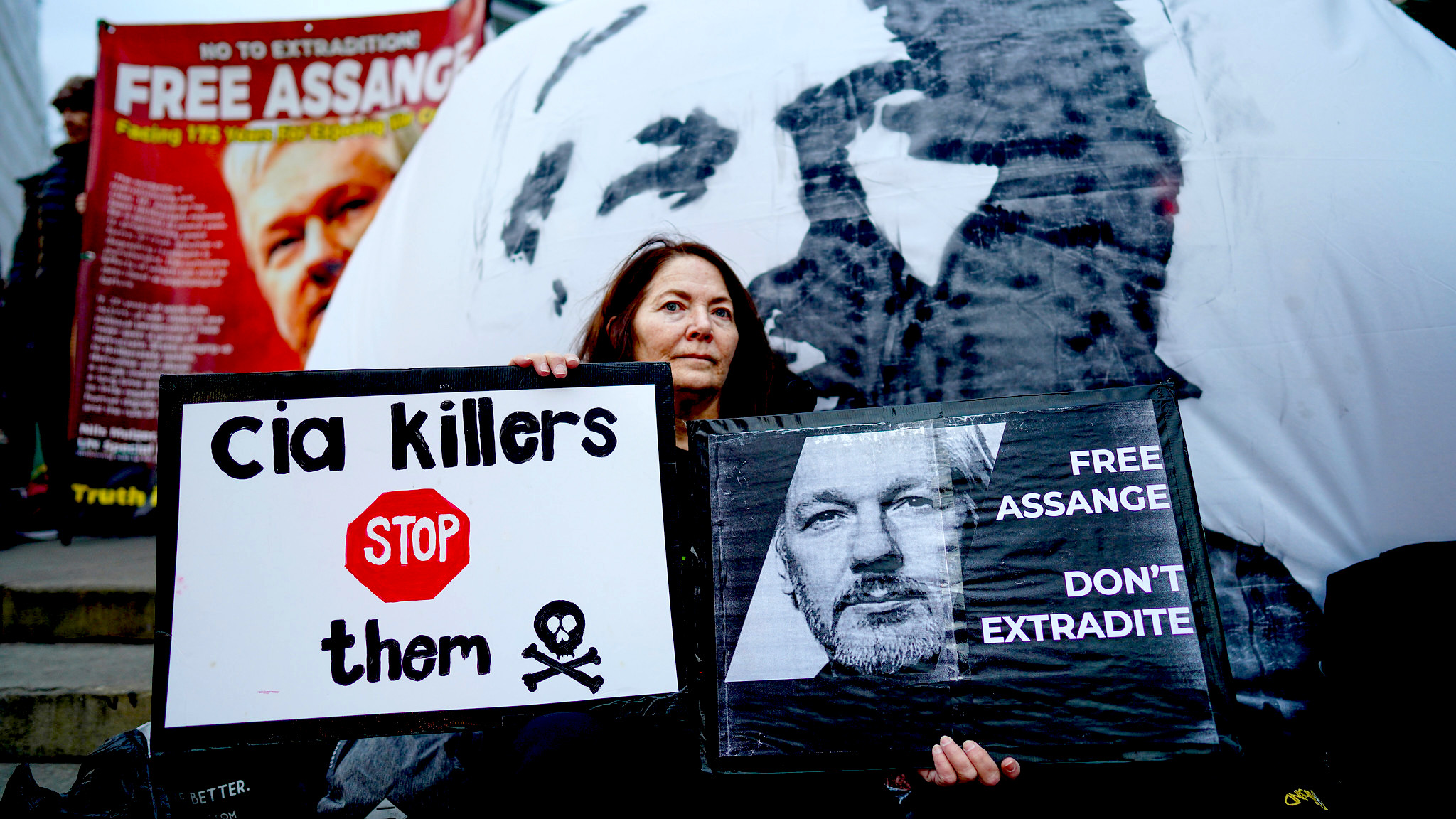Peter Oborne contrasts the free-press cause celebre that arose after the British phone-hacking scandal to the silence and hostility engulfing the far more consequential case of the WikiLeaks publisher.

Julian Assange outside the Royal Court of Justice in London, July 13, 2011. (acidpolly, Flickr, CC BY-NC-SA 2.0)
By Peter Oborne
Declassified UK
 Just over ten years ago, Lord Justice Leveson proposed tougher legislation of newspapers amidst general horror that journalists had hacked the phone of murdered schoolgirl Millie Dowler.
Just over ten years ago, Lord Justice Leveson proposed tougher legislation of newspapers amidst general horror that journalists had hacked the phone of murdered schoolgirl Millie Dowler.
His proposals were greeted with fury.
In The Daily Mail, Richard Littlejohn said they meant the “suppression of free speech.” This was, added Littlejohn, the “classic hallmark of a fascist regime.”
Mike Harris for The Daily Telegraph warned that “three centuries of press freedom will be consigned to the dustbin of history, with investigative journalism almost impossible and shackles imposed on our much-loved local press”.
Every title from the Murdoch press, Associated Newspapers and The Telegraph – the hegemonic groups which account for approximately 75 percent of mainstream newspaper readership – denounced the Leveson reforms.
Meanwhile they united to launch a concerted campaign – the so called free speech network – to block them.
It was one of the most effective campaigns in modern times.
Behind the scenes politicians were nobbled. Deals were struck. Leveson Two – the section of the enquiry which would have examined links among politicians, the police and press – was blocked.
Let’s contrast the campaign against Leveson with British media coverage of the U.S. attempt to extradite Julian Assange.
Another Watergate?

Assange supporters in a weekly protest on Sept. 16 outside Belmarsh Prison where Assange is being held. (Alisdaire Hickson, Flickr, CC BY-SA 2.0)
As I write Assange rots in a cell in high security Belmarsh prison, where he has been held for years. Any day now could see the WikiLeaks publisher sent to the United States for trial on trumped up espionage charges – then dumped in a U.S. jail for the rest of his life.
The consequences of such a judgement could not be more grim for free speech.
Any story which depends on obtaining documents from U.S. government sources will become impossibly dangerous.
President of Brazil speaking at the opening of the UN General Assembly today: "It is fundamental to preserve the freedom of the press. A journalist like Julian Assange cannot be punished for informing society in a transparent and legitimate way" | via @GloboNews #UNGA pic.twitter.com/Fg87GJbFpW
— WikiLeaks (@wikileaks) September 19, 2023
Break another Watergate scandal? Forget it.
No British journalist would dare to handle the material, let alone publish it. Any journalists involved could find themselves subject to extradition.
The more serious the story, and the more it needed to be published, the greater the danger.
Let’s spell this out.
Julian Assange is by far the most important case involving free speech this century. No wonder the late Daniel Ellsberg, who exposed so many of the U.S. lies about the Vietnam war, gave such powerful testimony for Assange before his death in June this year.
Ellsberg, the principled former marine who leaked the so-called Pentagon papers, said that he felt a “great identification” with Assange.
Cause Celebre?

Assange supporters outside the High Court in London on Jan. 24, 2022. (Alisdaire Hickson, Flickr, CC BY-SA 2.0)
So you would have expected British journalists and newspaper editors to have turned the Assange case into a cause celebre for media freedom.
Wrong.
The Assange story has been treated by much of the British media like an embarrassing family secret.
As I discovered when I carried out a survey of recent press reporting.
?? Almost nothing in our graphic has been reported in the UK national media.
Establishment journalists have never been interested in showing the nexus behind the persecution of a publisher – even when their own profession is under attack.
Read here — https://t.co/rLRJ2JQBIj https://t.co/ybYl1PRWlV
— Declassified UK (@declassifiedUK) May 27, 2022
The Times claims to be Britain’s foremost paper of record. There have been a handful of news stories such as “Assange not allowed to attend Vivienne Westwood’s funeral” and no opinion piece since the start of 2021.
That one wasn’t friendly. Written by James Ball, a former WikiLeaks staffer, the headline announced: “Assange is no hero. I should know – I lived with him and his awful gang.”
Donate to CN’s Fall Fund Drive
There has been a comparable lack of reporting in The Telegraph. Not much in the Financial Times. Ditto The Sunday Times – the paper once edited by the formidable investigative editor Harold Evans – and The Sunday Telegraph.
Richard Littlejohn, the columnist for The Daily Mail who absurdly compared the Leveson proposals to fascism, mocked Assange in a contemptible article as he emerged from incarceration at the Ecuadorian embassy in London: claiming that “he stank the place to high heaven.”
Liberal Left
The New Statesman is a sad case. Once a beacon of the liberal left, a hatchet job on Assange by Suzanne Moore in April 2019 set the tone.
“Wikileaks was the future once,” wrote Moore. “Remember? We were all excited about the vast info dumps revealing horrific war crimes and the killings of civilians in Iraq and Afghanistan. Then it became something else. It became him, and he did not care if the information he was releasing was helping Trump or Putin, outing gay men in Saudi Arabia, identifying informants or rape victims. Their names were out there and they were at risk.”
[As was shown conclusively by defense witnesses in his September 2020 extradition hearing in London, Assange worked assiduously to redact names of U.S. informants before WikiLeaks publications on Iraq and Afghanistan in 2010. U.S. Gen. Robert Carr testified at the court martial of WikiLeaks‘ source, Chelsea Manning, that no one was harmed by the material’s publication.]
To think that The New Statesman was once a supporter of press freedom, human rights and the radical left. Or that its editor Jason Cowley, occupies the same chair as Kingsley Martin or Anthony Howard.
To be fair to Suzanne Moore she did state that it was wrong to extradite Assange.
Not so The Economist, which actually supports extradition. The paper argued in April 2019 that
“the central charge – computer hacking – is an indefensible violation of the law. Neither journalists nor activists, like Mr Assange, have carte blanche to break the law in exercising their First Amendment rights. They are entitled to publish freely; not to break and enter, physically or digitally, to do so.”
In preparation for this piece I have repeatedly approached the magazine’s spokesperson asking if its position has changed. There have been no replies to my emails. Until The Economist publishes an editorial to the contrary, we must assume that the paper still supports extradition.
[Related: Caitlin Johnstone: How The Guardian Can Help Assange]
Even those titles which oppose extradition tend to do so superficially.
They fail to highlight the full horror of Julian Assange’s ongoing incarceration in Belmarsh. That the C.I.A. plotted to assassinate Assange.
[Related: WATCH: The CIA Suit & New Proof It Spied on Assange]

Free-Assange protester in weekly demonstration in London on Feb. 5, 2022. (Alisdaire Hickson, Flickr, CC BY-SA 2.0)
Or the magnitude and horror of what he revealed about the U.S.-led war on terror.
Such as the video of U.S. helicopter gunmen laughing as they shot at and killed 12 unarmed civilians in Iraq — including a Reuters photographer and his assistant. The U.S. refused even to discipline the perpetrators.
The core revelation that civilian casualties in Iraq were far higher than the U.S. had admitted. The systematic abuse at Guantanamo Bay. That 150 innocent inmates were held for years without charge.
And so on.
[Related: Consortium News’ series, The Revelations of WikiLeaks]
Old Bailey
No titles have properly reported the story, and virtually all of those that have, are from outside the mainstream media.
Only a handful of reporters regularly attended Assange’s four-week hearing three years ago at the Old Bailey: one from the specialist agency Central Court News, another from the Press Association; and court reporter James Doleman filing daily reports for Bridges for Media Freedom. There was a reporter from The Morning Star.
A BBC representative attended every day but appears not to have filed anything at all.
The former British ambassador Craig Murray, sitting in the public gallery with the Assange family, filed a series of brilliant daily reports. No British paper provided anything comparable.
[Related: CN Wins First International ‘Julian Assange Award’ for reportage of the Assange story.]
The Assange case proves the argument made by Noam Chomsky that mainstream media should be understood as an instrument of state and corporate power.
It is really not normal for the hall at the UN General Assembly to break into this kind of spontaneous applause.
The US has been losing the room internationally for a decade. The appalling treatment of Julian is a focus for that. https://t.co/W14Zs2GctK— Craig Murray – (@CraigMurrayOrg) September 19, 2023
I rang up the one figure from the mainstream media who has broken from this paradigm: Peter Hitchens has used his Mail column (credit to Mail editor Ted Verity) to make the case against extradition. “It could happen any day now,” he warned last month.
“After yet another brief, unsuccessful court hearing, a column of vans and police cars roars out of Belmarsh prison in London and hurries to Heathrow, where a manacled, stooped and blinking prisoner is handed over to American officials and bundled aboard a plane bound for Washington DC.”
Hitchens added: “He faces absurd charges of spying, when he never spied. His crime was to embarrass the US government by selectively releasing information that Washington had tried and failed to keep secret. I do not think this is a crime, here or there.”
Hitchens named several British columnists. “Charles Moore. Danny Finkelstein. Matthew Parris. Janice Turner. These are all people I respect greatly, people who are prepared to say difficult or unpopular things. They believe in liberty under the law. I would love to see their voices raised in favour of Assange. I just don’t think that they’ve made the connection. It’s not too late for them to do so.”
Peter Oborne is a journalist and author. His latest book is The Fate of Abraham: Why the West is Wrong about Islam.
—Research by Nicholas Brookes.
This article is from Declassified UK.
Donate to CN’s
Fall Fund Drive



My counter tis I see
Land of hypocrisy.
We need more journalists like Julian Assange—-otherwise the U.S the U.K. . and others will find they have lost more than they would ever gain. Lying is always a sad defense, America et al.
“…. and he did not care if the information he was releasing was helping Trump or Putin, outing gay men in Saudi Arabia, identifying informants or rape victims. Their names were out there and they were at risk.”
Did this happen? Oborne doesn’t say for those not knowing the case.
“… the C.I.A. plotted to assassinate Assange.”
There is evidence, although I do not regard it as conclusive, that the CIA killed John Lennon.
There is a new book coming out on this subject later this year which, hopefully, will resolve the matter.
In the meantime, we have Fenton Bresler’s book “Who Killed John Lennon?” which came out in 1989.
The media has been very assiduous in sticking to the official narrative on his.
When the majority of mainstream media outlets are afraid to publish a controversial story (that goes against the ‘approved’ narrative), then you know for certain that freedom of speech has gone. When those same outlets support and encourage censorship of the individual, then you know that any lingering doubt have gone.
This means that the most important pillar of democracy has crumbled, opening the way for totalitarianism in all its ghastly forms. And that it turn has eroded the impartiality of the judicial system, allowing it, and the media, to be used as tools by the ruling regime.
Democracy exists in name only. There is no longer any real freedom of speech or fair justice. Individual rights and freedoms have been drastically reduced. Elections are meaningless, a revolving door of vested interests and corruption, with no meaningful representation of the electorate permitted.
When will people in the west wake up to the harsh reality? And when they do, what will they do about it, if anything?
“James Ball” former WikiLeaks staff, or is that
“Judas Iscariot” of modern journalism?
The story is as awful as it has been for all these years since the faked Swedish charges drove him into unjust incarceration.
What’s changed is that the current context of the story. This a world in which Germans, of all people, can look away in silence as a satirist and playwright, the American ex-pat CJ Hopkins, is crucified on charges everyone knows to be lies. Everyone knows, in fact, that the outrageous falseness of the charges Are the point: Judgement is passed in flagrant violation of due process before the victim’s court date, on prima facia ridiculous charges, in order to command the silence of those who know better and ought to speak up. And Hopkins is far from alone. The criminalization of dissent has proceeded well beyond the point at which all corporate media is easily understood to be not merely unreliable, but actively in service of power.
Mr Hodge, while I applaud your comment about C J Hopkins and his place in all this, may I respectfully point out that there were no ‘Swedish charges’. Julian was never charged over what happened in Sweden, he was simply wanted for questioning about it.
I think this distinction is important because ‘charges’, in part, set the stage for everything that followed. I’ve been reading about these supposed charges for years, even from respected journalists, which just goes to show how a slanderous allegation becomes truth.
@ Robyn (comment of September 20, 2023 @ 19:47)
“Mr Hodge, while I applaud your comment about C J Hopkins and his place in all this, may I respectfully point out that there were no ‘Swedish charges’. Julian was never charged over what happened in Sweden, he was simply wanted for questioning about it.
I think this distinction is important because ‘charges’, in part, set the stage for everything that followed. I’ve been reading about these supposed charges for years, even from respected journalists, which just goes to show how a slanderous allegation becomes truth.”
As you have described them herein “These supposed charges” were not imagined by “journalists” of any stripe, the were contrived in concert by Swedish government law enforcement minions and two women who had consensual sexual relations with Assange. The only possible legally actionable offence by Assange was his alleged refusal to use a condom with one of the women; both of whom formally withdrew all charges the government prosecutor was attempting to pursue. Once a new government prosecutor was eventually appointed, the entire case was abandoned for lack of cause, the attempt to capture Assange in order to expedite him the USA failed, and no further warrant for Assange’s appearance in Sweden was required.
For someone who professes so adroitly that “I’ve been reading about these supposed charges for years…” it seems a bit strange to claim that no such charges were ever levied, rather actually formalized or falsely accused in pursuit of a corrupt motive. It is my concerted opinion that one need only consult the extensive coverage of this persecution of Julian Assange right here on CN to be better informed on the origins of this ongoing horror story that has become the life of Julian Assange and his entire family for the past 14 years and counting.
The governments of the United States and Great Britain need to stop this failed corrupt charade and free Julian Assange; then turn their sights inward to repair, not only their collectively damaged tenets of democratic law and order, but the ethical and moral behavior that their respective citizens rightfully expect from a representative Democratic Republic.
As Usual,
EA
Very well said Good Sir!